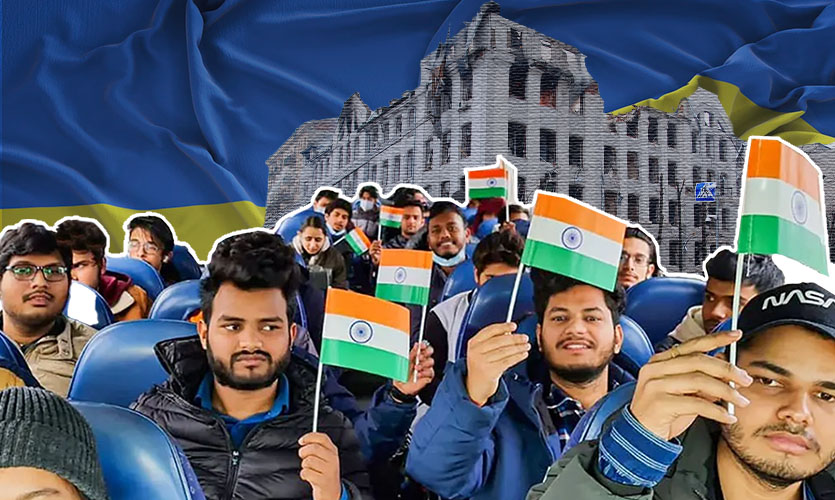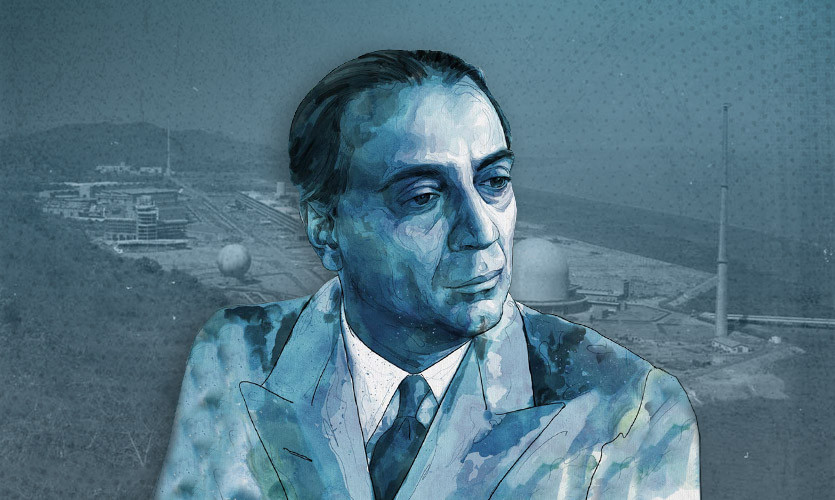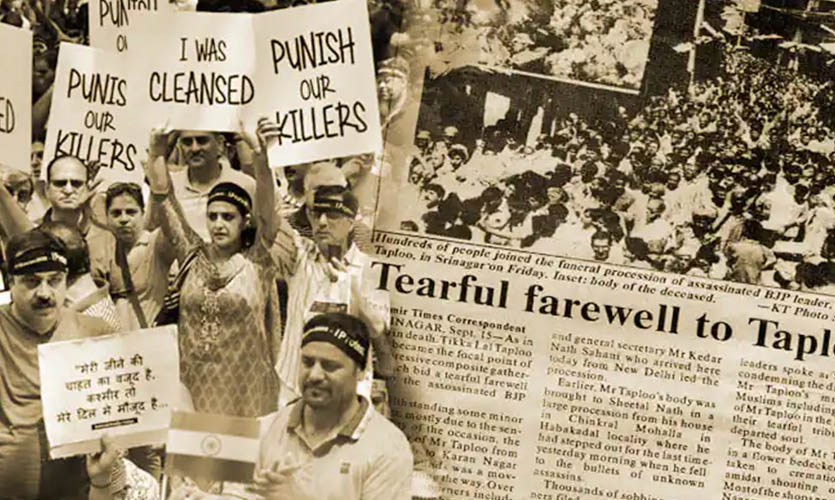Five months since the armed conflict began earlier this year, Russia’s invasion of Ukraine continues to leave eastern Europe and world economies in disarray.
While India claims to be largely unaffected by the current affairs in the region (barring rising inflation, supply chain pressures, and geopolitical tensions), the medical students who returned safely face a different reality.
Recent Developments
On July 26, as the fourth day of the five-day hunger strike organised by Ukraine-returned students in Delhi came to pass, news of the Centre’s latest update on their possible accommodation in Indian universities started doing rounds. In response to a written inquiry on whether the National Medical Commission (NMC) has approved several states’ request to accommodate the medical students returned from Ukraine in their universities, the Union Minister of State for Health Dr Bharati Pravin Pawar informed, “There are no such provisions in the Indian Medical Council Act, 1956, and the National Medical Commission Act, 2019, as well as the regulations to accommodate or transfer medical students from any foreign medical institutes to medical colleges in India.” She further added, “Foreign medical students/graduates (FMGs) are either covered under ‘Screening Test Regulations, 2002’ or ‘Foreign Medical Graduate Licentiate Regulations (FMCG), 2021.”
This validated the NMC’s statement in response to a RTI query filed by Kannur-based health activist Dr Babu KV, regarding the West Bengal government’s “observership” initiative. The state government had allowed 394 students to only observe practical training in private medical colleges. The NMC declared that states cannot accommodate the students unless the regulatory body takes a national-level policy decision. “The observership was illegal and could set a precedent in other states. NMC is playing down the decision of West Bengal government on observership,” said Dr Babu KV.
Dr Pawar further informed the Lok Sabha, “According to information from the MEA (Ministry of External Affairs), the Indian Embassy in Kyiv has spoken with all the relevant Ukrainian colleges to ensure that students may easily obtain transcripts and other papers. On the Embassy website, all information is available to help students with any corresponding concerns.” As per the latest from External Affairs Minister Dr S Jaishankar, “Apart from the efforts being made in the country by concerned department to help these medical students (who have returned from Ukraine due to war), the External Affairs Ministry is also in talks with Ukraine’s neighbouring countries to find out if such students can be admitted in their universities.” He had added, “Recently, the Hungarian Foreign Minister was in India and he told me nearly 1,250 Indian students have applied for admission in universities in his countries. He assured us Hungary will try to accommodate as many students as possible.” So far, Russia, Kazakhstan and the Kyrgyz National University have offered to help the Indian students evacuated from Ukraine in continuing their studies.
On April 29, the Supreme Court had directed the NMC to come up with a one-time scheme within the next two months, for those students who couldn’t complete their clinical training abroad, and allow them to continue the same in medical colleges in India. Following this direction, on July 18, the NMC filed an affidavit saying that students who had finished their studies online but couldn’t appear for the clinical training, can appear for the Foreign Medical Graduate Exam (FMGE), passing which will allow them to practice medicine in India, as part of a one-time relaxation offered by the NMC. FMGs who get through the exam will be required to complete the two-year Compulsory Rotating Medical Internship (CRMI), instead of the standard one year internship. Although in its most recent affidavit, filed on July 23, the NMC clarified that this relaxation is only for final year medical students. Taking the affidavit on record, the apex court dismissed all related petitions. “No further orders are called for in the present miscellaneous applications. The miscellaneous applications are accordingly disposed of. Pending application (s) if any, also stand disposed of,” it ordered.
No Country For FMGs
Following Dr Pawar’s clarification in the Lok Sabha, Tamil Nadu CM MK Stalin wrote to PM Narendra Modi, requesting him to take steps for securing the future of students who have returned from war-torn Ukraine. “While we are cognizant of the fact that this reply has been given in the specific context of some steps taken in a state, I would like to highlight that this has once again brought the uncertain future of the students to the fore,” he wrote. He added, “Given the current situation in Ukraine, it may not be practically possible for these medical students to immediately return to their colleges in Ukraine and the uncertainty is likely to prevail even after the cessation of hostilities. Considering this, our state has been repeatedly urging you to take necessary steps to accommodate these students in India or in suitable Universities abroad.” Stalin reiterated his stance from March, when it was also highlighted that surrounding countries involved in or directly affected by the war may not be the ideal places for the students to continue their disrupted studies. Russia’s offer to accommodate Indian students may certainly not be ideal for the already distressed parents.
Speaking to The Sparrow, Bukovinian State Medical University’s fifth-year medical student Uditanshu Hashia sheds more light on the events. “We have had no official communication from the government or the NMC, regarding our studies. Since my university comes under the western most Bukovinian province, in Chernivtsi city, it is very positive about the outcome of war and has been constantly in touch with us, although it has offered only a verbal consolation.” He adds, “While we are thankful to the Indian government for making Operation Ganga a success and getting us out of the line of fire, coming back to India has been like being surrounded by frying pans for all of us.” Since the pandemic, most of the world has adapted to the hybrid setting, raising questions about problems faced in studying in an online or distance model. “Clinical postings are impossible online. To see a patient is different than to touch and observe. The difference is night and day. Online video lectures can give us knowledge, but it cannot give us practical experience,” says Uditanshu.
Responding to the feasibility of appearing for a screening test, as mandated by the NMC, he explains, “We have no problem appearing for additional tests. But last year the NMC decided to scrap the FMGE and replace it with the National Exit Test (NEXT) as the common licensing exam, which was supposed to start in 2023. The FMGE is held in January, which will be in the middle of my final year. So technically we still don’t know which exam we need to prepare for and when. Patterns for both exams are different… everything is as uncertain as when we first arrived.” In 2020, the Medical Council of India was dissolved following its failure to furnish proof of qualification of doctors inspecting medical colleges, and multiple corruption related CBI inquiries into several MCI authorities including the national body’s president – Ketan Desai. The Indian Medical Council Act cited by Dr Pawar in the Lok Sabha was repealed, and the NMC was constituted to replace it, although the transition has been anything but seamless. “It seems as if the individual authorities have changed, but the system within has remained the same,” supposes Uditanshu. He continues, “This is especially unfortunate for our juniors in the first and second years, who have been advised to repeat their courses from scratch.”
Growing Pains
Five months down the line, while final year students pending only their internship have a little more clarity, most of the 18,000 students who returned from Ukraine continue to be in the same boat as they were in February. “It really hurts to see that while India boasts about so many of its citizens studying abroad and working at top positions, glorifying everything, but it does not want us. It is upsetting to be told that I can’t serve my country and my people, despite being qualified to do so,” shares Uditanshu.
The pandemic and the hazards it brought are enough reasons to realise the need for more and more medical health professionals in India, and avoid the continuing brain drain. To put it in context, as per the 2021 data by the World Health Organization (WHO), India ranks 184 out of 191 countries in terms of health spending. India has 1.4 beds per 1,000 people, 1 doctor per 1,445 people, and 1.7 nurses per 1,000 people. According to the Ministry of Family and Health Welfare, as part of the National Health Mission, India has 1 sub-centre per 5,000 people in general areas and 1 per 3,000 in difficult, tribal and hilly areas; 1 primary health centre per 30,000 people in general areas and 1 per 20,000 in difficult areas; and, 1 community health centre per 1,20,000 people in general areas and 1 per 80,000 in difficult areas. Moreover, as of today, there are only 612 medical colleges in India, with only 92,000 seats across all government and private colleges. Notably, the number of candidates appearing for the exam crossed the 18-lakh mark this year, for the first time.
Uditanshu continues, “The growing Indian population needs better health care. The NMC needs to have a smoother and lenient conduct for once. With a good amount of clinical practice already available in India, everyone will catch up eventually. Otherwise, they’ll be playing with thousands of young minds who dream to pursue this noble profession, and the health of the rest of the citizens.”
On July 27, after the completion of the hunger strike led by the students in Delhi, RB Gupta, chairman of the Parents Association of Ukraine Medical Students announced that they will approach the Supreme Court to file a petition. He informed, “We are planning to approach the Supreme Court. We have contacted the team of Harish Salve (former Solicitor General of India) and Senior Advocate Neha Nagpal has been appointed to represent our case. We are planning to file the petition in the first week of August. The name and detail of every student from all over India who has returned from Ukraine will be mentioned in the petition. The process for collecting these details has already started.”
“The impression we get is medical education has become a business, and medical regulation has also become a business. That is the tragedy of medical education in this country.”
– Justice DY Chandrachud, SC observation bench, October 2021
The Horus Eye is a weekly column written by Divya Bhan analysing current affairs and policies. This column does not intend or aim to promote any ideology and does not reflect the official position of The Sparrow.
Also read: Are India’s Educational Institutes Being Leveraged To Forward Political Agendas?
Also read: How Is The ‘Neighbourhood First’ Policy In India’s Interest?










